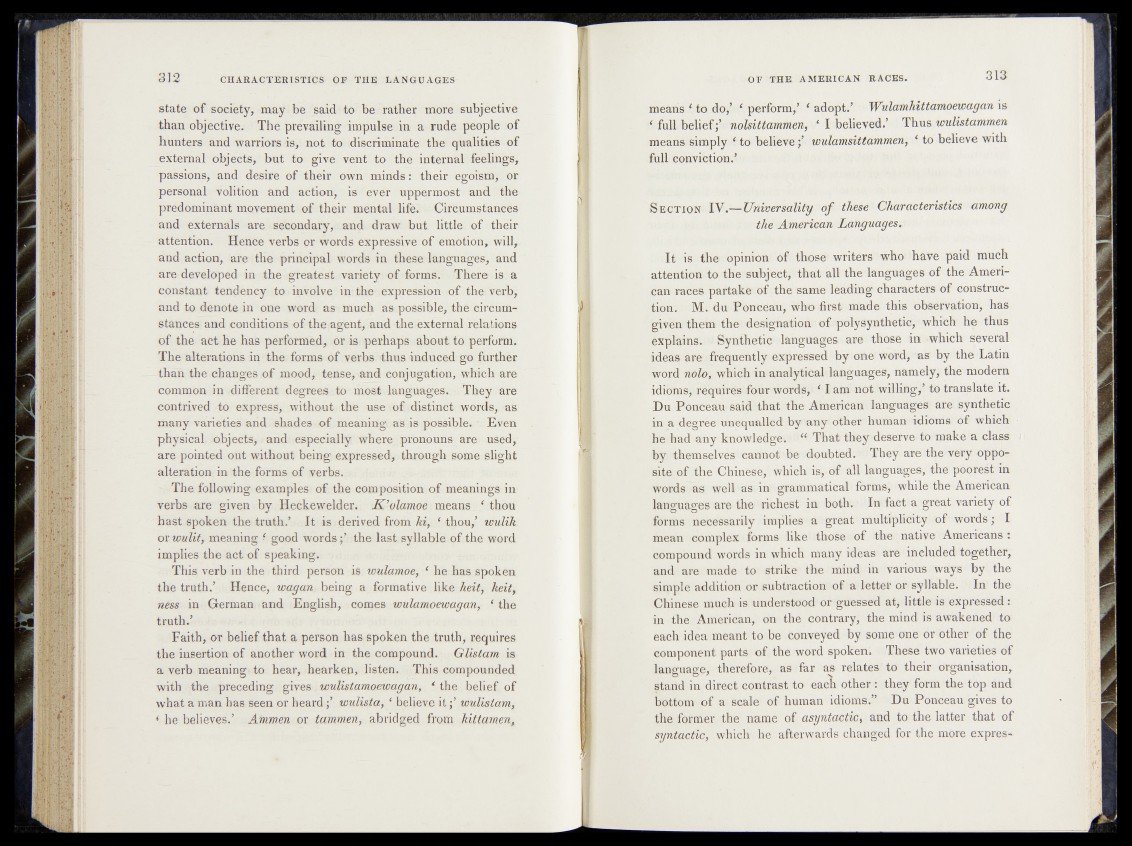
state of society, may be said to be rather more subjective
than objective. The prevailing impulse in a rude people of
hunters and warriors 4s, not to discriminate the qualities of
external objects, but to give vent to the internal feelings,
passions, and desire of their own minds: their egoism, or
personal volition and action, is ever uppermost and the
predominant movement of their mental life. Circumstances
and externals are secondary, and draw but little of their
attention. Hence verbs or words expressive of emotion, will,,
and action, are the principal words in these languages, and
are developed in the greatest variety of forms. There is a
constant tendency to involve in’the expression hfi the Vfesh^
and to denote in one wordt as much as ipossible, the circumstances
and conditions of the agent, and the (external relations
of the act he has performed, or is perhaps about to perform.
The alterations in the forms of verbs thus induced g«: further
than the changes of mood, tense, and conjugation, which are.
common in different degrees to most languages. They are
contrived to express, without the use 5of distinct words, -as
many varieties and shades of.meaning as is possiblcf* Even
physical objects, and especially where, pronouns are used,
are pointed out without being expressed, through some slight
alteration-in the forms of verbs.
i The following examples of the composition of meanings in
verbs are given by Heekewelder. K ’olamoe means * thou
hast spoken, the truth.’ It is .deriv'ed from hi, ‘ thou,’ wulik.
or wulity meaning ‘ good words;’ the last syllable of the word
implies the act of speaking.
This verb in the third person is wulamoe, ‘ he has spoken
the truth/ Hence, wag an, being a formative like heit, heit,
ness in German and English, comes wulamoewagan, ‘ the
truth.’
Faith, or belief that a person has spoken the truth, requires
the insertion of another word in the compound. Glistam is
a verb meaning» to hear, hearken, listen. This compounded
with the preceding gives, wulistamoewagan, ‘ the belief of
what a man has seen or heard / wulista, ‘ believe i t / wulistam,
‘ he believes.’ Afrimen or tammen, abridged from kittament
means ‘ to do/ | perform,’ ‘ adopt/* Wnlamhittamoewagan is
‘ full belief}’f nolsittammm, • ‘ I believed.’ Thus wulistammen
means Simply#to- believe/ wulamsittammen} 11 to believe with
full conviction/
S ection IV.—Unwersality o f these > Characteristics among
tke Mfn&rieati EaMguages^ ;
It n®' the opinion of those writers’ i who^ have paid much
attention to the subject,“'that all the1 languages df the American'
races partake of the same5 leading characters* of construction.
M. d u d F ^ e au , who ^rsf made this Observation, has
given therii the 'designation of-ptoly synthetic?/which he thus
explains. * Synthetic 'languages - areP those - in which several
ideas are^; frequently-expressed jay on® word/'as* by' the Latin
word «<5?©, which in analytical'languages, namely/the modern
id iomsp requires four words, 11 am not ‘willing/ to translate it.
Du Poneeah said that the AmeriMa'brlangudiges^ are'synthetic
in a degreem-nequalled by any other humairfadioms 'df* which-
beihade,ny knowledge»-'^ That theydeserve to make-a class
by. themselves - cannot' be 'doubted. They are' the-very opposite
of the Chinese/ which is, of all languagesy the poorest in
words a s well as in grammatical forms, while-the American
languages are the "richest in both.1 Ii# fact >a-great variety of
forms necessarily implies1 a -great1 multiplicity *&)f words; I
mean complex forms like those* of the: native Americans:
compound words in which many ideas are includeff together,
and are made to strike the mind in various ways - by1 the
simple addition or s ub traction11 o f a letter ori Syl]able. fb In i the
Chinese much is understood or guessed at, littteiis expressed i
in the American, on the contrary, the mind is awakened to
each idea meant to be conveyed by some one brbthei? of the
component parts of the word spoken. -These two varieties of
language, therefore,jj as far as- relates' to their: organisation,
Itatid in direct contrast to each other: they form the top and
bottom of a scale of human idioms.”* Du Ponceau gives to
the former the name of asyntactic, and to the latter that of
syntactic, which he afterwards changed for the mdre expres